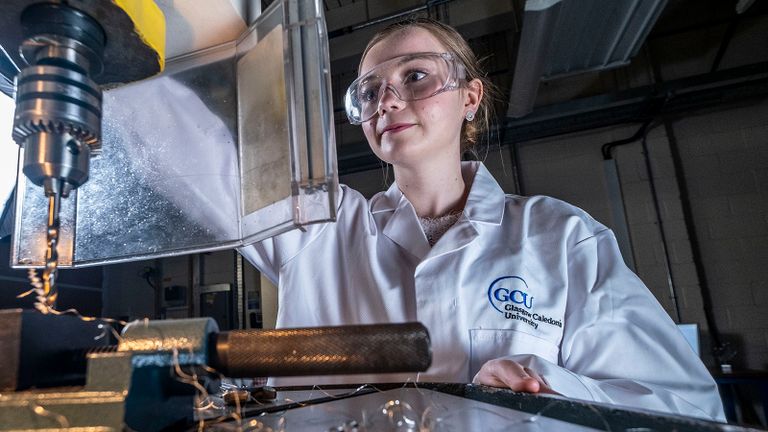Glasgow Caledonian University has reached new heights in our academic league table this year, where it is the UK’s top-ranked modern university and secures Runner-Up for Modern University of the Year 2026. Nicknamed Cally by its students — though the spelling is a moot point (Calley, Cali or Caley are all in use) — its mission is to be the “university for the common good” and GCU has added a 21st-century focus to make its graduates career-ready.
More than half of its undergraduate programmes are accredited by professional bodies and most include a work placement. In keeping with the career focus, GCU is Scotland’s leading provider of graduate apprenticeships (equivalent to degree apprenticeships in England), including civil engineering, cybersecurity and accountancy. It is also one of the largest providers of graduates to NHS Scotland and has been responsible for training most of Scotland’s non-medical eyecare professionals.
Based mainly on a single campus in the centre of one of the UK’s buzziest student cities, GCU also has a postgraduate campus in London that focuses on seven courses, including fashion and luxury business.
What is Glasgow Caledonian University’s reputation?
The university traces its roots to two historic institutions: the Queen’s College, Glasgow (founded in 1875) and Glasgow Polytechnic (begun in 1971). GCU ranks 36th this year, buoyed by the 18th highest entry standards and 34th best graduate prospects in the UK.Also helping to fuel its league table ascent is its research profile, with nursing and allied health subjects producing some of its best work in the Research Excellence Framework (REF 2021). The latest National Student Survey (NSS) puts the university at 55= for overall student experience. Upgrades to the campus, including student accommodation and teaching facilities, came on stream from the start of the 2025 academic year.
Courses are organised within three schools: computing, engineering and built environment; business and society; and health and life sciences. The School of Computing, Engineering and Built Environment is one of Britain’s leading teaching centres for building and surveying. The Glasgow School for Business and Society offers degrees such as entrepreneurial studies and risk management.
GCU helped to set up the African Leadership College in Mauritius in 2017 and co-founded the Grameen Caledonian College of Nursing in Bangladesh in 2010. The university also has links with institutions in Oman and China.
What degree courses have been discontinued and what new courses are available?
Biological sciences is no longer recruiting from September 2025.
What are Glasgow Caledonian University’s entry requirements — and my chances of getting in?
Offers for undergraduate degrees range from 147 Ucas tariff points (AAA at A-level) to 96 (CCC), and in Scottish Highers it is BBCC up to AABBB. Minimum entry requirements apply for those eligible for contextual offers, which were made to about a fifth of new entrants in 2024. Clearing accounted for 5 per cent of admissions in 2024.
What are the graduate prospects?
An enhanced Employment on Campus service opens in 2025-26 to support students looking for paid work, while the Careers Centre advertises graduate jobs, internships, placements and part-time work. In our analysis of the Graduate Outcomes survey, GCU is 34th, based on the proportion of graduates in high-skilled jobs or further study 15 months on.
What is Glasgow Caledonian University campus like?
The Heart of the Campus building is the centrepiece of GCU’s site, near Queen Street station. Standout facilities include the Sir Alex Ferguson Library, providing study spaces for 1,800 students as well as a “relax and renew zone”, a virtual hospital, the Vision Centre for optometry students, and the Fashion Factory. There is also a law clinic, a cold case unit, a broadcasting suite and a simulation suite for nursing students. GCU has a postgraduate campus for fashion students in London.
When can I visit?
gcu.ac.uk
Everything you need to know about Glasgow Caledonian University's student life and wellbeing support
Glasgow offers a hard-to-beat music scene and student-centric fun. The university has waived membership fees for students’ use of the Arc health and wellbeing centre, which has three gyms and two large sports halls.
The student wellbeing team comprises counsellors, wellbeing and mental health advisers, and a disability service. GCU was the first Scottish university to hold the Student Minds’ University Mental Health Charter award. It has accreditation from the National Autistic Society in recognition of its support for autistic students and has introduced a transgender support policy.
What do the students say?
“At GCU it’s more than just the course you’re studying — you can immerse yourself in student life, get experience in business and sports, meet different people and really advance yourself as a person.”
Hannah Andrews, BSc podiatry student
What about student accommodation at Glasgow Caledonian University?
Caledonian Court student accommodation is fresh from an upgrade and early application is advised. There are only 655 residential places, and only 70 per cent of applicants can be housed in halls. Off campus, the historic West End’s red-brick flats are popular — if you act fast.
How diverse and inclusive is Glasgow Caledonian University?
GCU ranks 3rd for the number of students from non-selective state schools, 96.7 per cent, and 2nd for ethnic minorities at 18.2 per cent, but it has dropped four places to 8th overall in Scotland.
Everything you need to know about scholarships and bursaries at Glasgow Caledonian University
Awards include a £6,000 cash-back bursary for Rest of the UK (RUK) students. Common Good scholarships of up to £1,500 a year are awarded to students who qualify under criteria to widen participation. More than 10 per cent of students receive direct financial assistance from the university, including subject-specific scholarships to high achievers.
